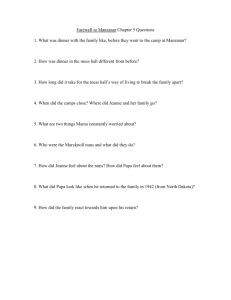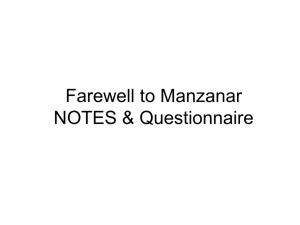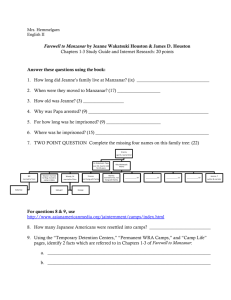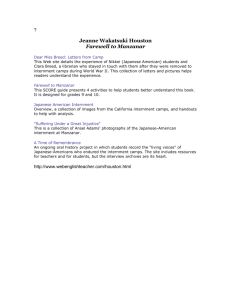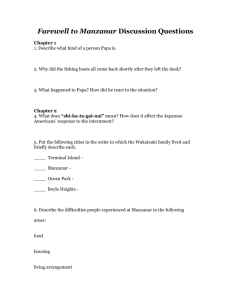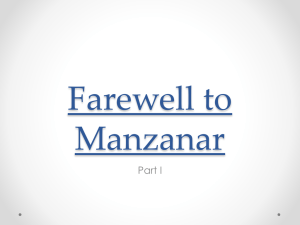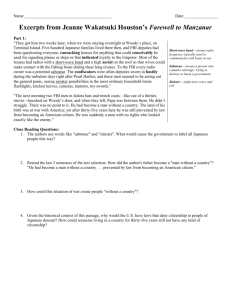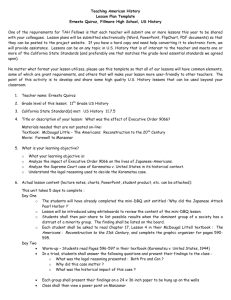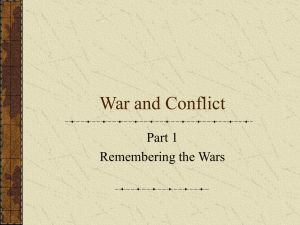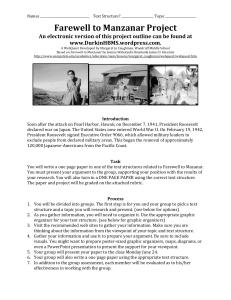Farewell to Manzanar Chapters 1-2 Worksheet
advertisement
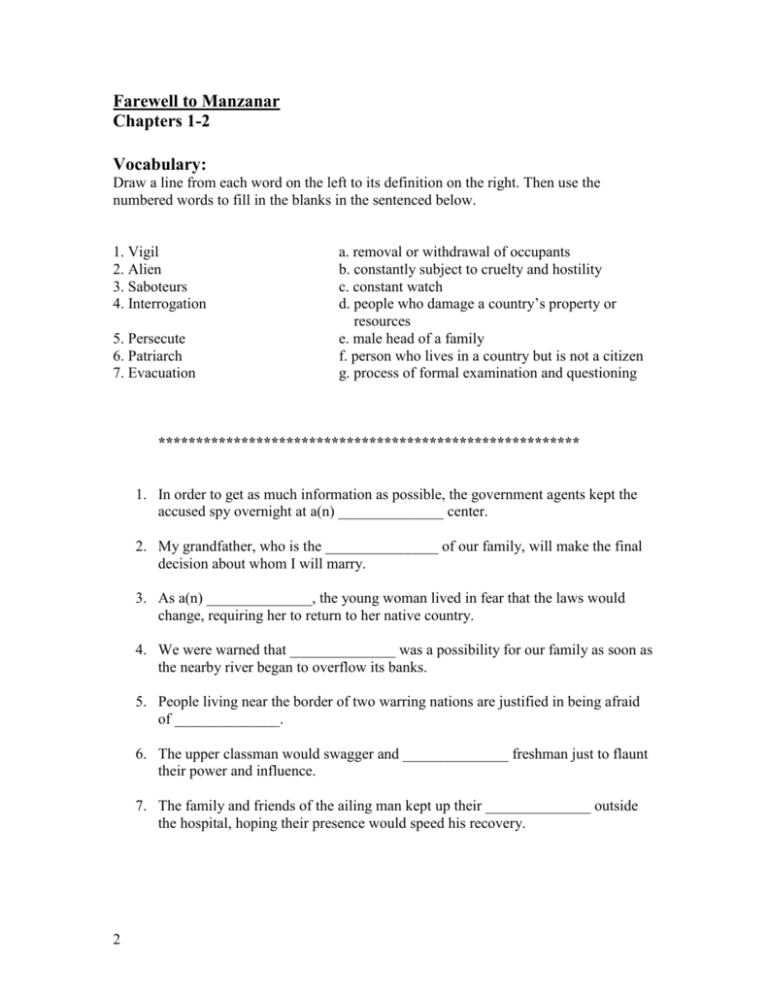
Farewell to Manzanar Chapters 1-2 Vocabulary: Draw a line from each word on the left to its definition on the right. Then use the numbered words to fill in the blanks in the sentenced below. 1. Vigil 2. Alien 3. Saboteurs 4. Interrogation 5. Persecute 6. Patriarch 7. Evacuation a. removal or withdrawal of occupants b. constantly subject to cruelty and hostility c. constant watch d. people who damage a country’s property or resources e. male head of a family f. person who lives in a country but is not a citizen g. process of formal examination and questioning ******************************************************** 1. In order to get as much information as possible, the government agents kept the accused spy overnight at a(n) ______________ center. 2. My grandfather, who is the _______________ of our family, will make the final decision about whom I will marry. 3. As a(n) ______________, the young woman lived in fear that the laws would change, requiring her to return to her native country. 4. We were warned that ______________ was a possibility for our family as soon as the nearby river began to overflow its banks. 5. People living near the border of two warring nations are justified in being afraid of ______________. 6. The upper classman would swagger and ______________ freshman just to flaunt their power and influence. 7. The family and friends of the ailing man kept up their ______________ outside the hospital, hoping their presence would speed his recovery. 2 Chapters 1- 2 Homework Questions: 1. How did Papa show that he took great pride in his work? 2. Why was Papa arrested after the Japanese bombing of Pearl Harbor? What was the reaction of his family? 3. What did Jeanne mean when she said that Papa had become “a man without a country”? 4. Why was Chapter Two entitled “Shikata Ga Nai”? 5. How did Jeanne feel toward other Asians prior to the bombing of Pearl Harbor? Find a quote from the story to show Jeanne’s opinion. Remember the page number. 6. Why did Mama move the family to Terminal Island after Papa was taken into custody? 7. What hardships did the Wakatsuki family, as well as other interned Japanese Americans, face upon their arrival at Manzanar? 3 Chapters 1 -2 Class Discussion Questions: 1. In what ways were the family members victims of greed, ignorance, hostility, and bigotry? 2. Why do you think the farmer family structure of a patriarchy made life more difficult for the Wakatsuki family after Pearl Harbor? 3.Read the quotation by Henry Steele Commager at the beginning of Part One of Farewell to Manzanar. Then consider the fact that citizens of German and Italian descent were not interned during War World II even though the United States was at war with those countries. Do you think the United States government was justified in passing Executive Order 9066 and interning loyal Issei, most whom had been denied citizenship by the United States, as well as Nisei, who were United States citizens by birth? Literary Devices: 1. Personification- Read the first line of the poem by Thich Nhat Hanh that appears at the beginning of Part One. Notice the way in which the poet has given “life” the human ability to walk and leave footprints. This technique of attributing human qualities or abilities to ideas and things is called personification. What do you think the first line of the poem means? What meaning does the entire poem have for you? 4 Chapters 1- 2 II. Metaphor- A metaphor is a figure of speech in which a comparison between two unlike objects is suggested or implied. For example: They [the ships] floated awhile, then they began to grow, tiny gulls becoming boats again, a white armada cruising toward us. What is being compared? ______________________________________________________________________ Why is this an apt comparison? ________________________________________________________________________ ________________________________________________________________________ Writing Activities: 1. Write a poem of your using personification. You may structure your poetry as a rhyming poem or as free verse, without rhyme or regular beat. Be prepared to read your poem aloud for your classmates. 2. Write about a time when you were a victim of prejudice or felt helpless in the face of unfair treatment. Describe your reaction and tell whether you would act the same way if the incident should recur. 5 Farewell to Manzanar Chapters 3 – 5 Vocabulary: An analogy is a word equation in which the first pair of words has the same relationship as the second pair of words. For example: BOISTEROUS is to SEDATE as ARROGANCE is to HUMILITY. Both pairs of words are opposites. Choose the best word from the Word Box to complete each of the analogies below. Chaos Integrated Edicts Permeate WORD BOX Scan Ventilation Temporary 1. UNFINISHED is to COMPLETE as PERMANENT is to _________________________. 2. POKE is to SHOVE as ____________________is to STARE. 3. CHANGE is to TRANSFORM as SPREAD is to ________________________. 4. CALMNESS is to ____________________ as PRAISE is to INSULT. 5. __________________ is to UNIFIED as REVERENT is to RESPECTFUL. 6. RULES are to ____________________ as LAWS are to REGULATIONS. 7. RADIATOR is to HEAT as FAN is to _________________________. 6 Chapters 3-5 Homework Questions: 1. What events and conditions demonstrated that the government was poorly prepared for the internees who entered Manzanar? 2. In what ways were rights to privacy ignored at Manzanar? What did this reveal about the government’s attitude toward the internees? 3. How did humor and resourcefulness help the Wakatsukis through the adversities of the camp? 4. Why did the author refer to the internees as “a band of Charlie Chaplins marooned in the California desert”? 5. How did the manner in which meals were eaten and the lack of privacy at Manzanar affect family structure? 6. Why was Jeanne attracted to Catholicism? 7. What was the family’s response to Papa when he joined them at Manzanar? 7 Chapters 3-5 Literary Device: Metaphor What is being compared in the following metaphor? (Find this metaphor in the beginning of chapter 3) A skin on the covered floor. Why is this better than saying, “the floor was sandy” Writing Activity: Imagine you are Jeanne and write a journal entry expressing your thoughts and feelings the day Papa came to Manzanar. 8 Farewell to Manzanar Chapters 6 – 8 Vocabulary: Draw a line from each word on the left to its definition on the right. Then use the numbered words to fill in the blanks in the sentences below. 1. entrepreneurs 2. merchant 3. tyrant 4. samurai 5. magistrate 6. patron 7. valet a. person who exercises power in a cruel or unjust manner b. member of an ancient Japanese military class c. officer who administers the law d. person who buys and sells item for profit e. person who supports or encourage another person f. male servant who attends to the personal needs of his employer g. people who organize and run new or risky businesses ………………………………………………………………………. 1. There are many young people in Japan today who idealize the ____________________ warriors of a time long past. 2. As the only __________________________ in our small village, he was called upon to decide civil and criminal cases 3. At the turn of the century, America attracted runways, pilgrims, adventurers, and______________________ who all hoped for an opportunity to live a better life. 4. If I become a millionaire, I will use my wealth to become a(n) _______________________ of the arts, supporting young artists and writers. 5. The government official was such a(n) ______________________ that people worried they would be sent to jail if they disagreed with him. 6. When my paycheck did not arrive in the mail, I had to ask the __________________ in the grocery store to extend credit to me so that I obtain food. 7. Having always had the services of a(n) ______________________, the young prince did not know how to dress himself. 9 Chapters 6 – 8 Homework Questions: 1. Why did Jeanne consider Manzanar her birthplace, but the end of life for Papa? 2. How did Papa’s family background foreshadow events that would happen in his own family? 3. How had Papa become assimilated into life in America? How was Mama’s experience different? 4. What did Papa’s interview at Fort Lincoln reveal about his character? 5. What was Papa’s response when the interrogator asked, “Who do you want to win this war?” What did Papa mean? 6. Why did Jeanne think Papa’s drinking was caused by his isolation after his arrival at Manzanar? 7. Jeanne thinks that her world is coming apart at the end of these chapters. Find a quote from the story to show this point. 10 Chapter 6-8 Class Discussion Questions: 1. How do you think Papa’s pride affected his ability to succeed in America? 2. Why do you think Mama ignored her parents and married Papa? 3. Do you think Papa should have been totally honest at his Fort Lincoln interview? 4. What information might he have kept to himself at the Fort Lincoln interview? 5. Do you think Kiyo owed his father and apology for his actions? Literary Device: Symbolism A symbol in literature is an object, event, or person that represents an idea or a set of ideas. What did Papa’s cane symbolize for him? ________________________________________________________________________ ________________________________________________________________________ ________________________________________________________________________ Writing Activities: 1. Create a character web for yourself or for someone you know. Use the web as notes to write a character sketch of that individual. 2. Write about a time when you or a brother or sister felt the need to apologize to a parent or another adult in the family. Describe the wrongful behavior and tell how the adult reacted to the apology. Also, indicate whether this incident affected a future relationship. 11 Farewell to Manzanar Chapters 9 – 11 Vocabulary: Synonyms are words with similar meanings. Draw a line from each word in column A to its synonym in column B. Then use the words in column A to fill in the blanks in the sentences below. A 1. emasculation 2. renounced 3. endurance 4. plaintive 5. martial 6. precisely 7. conspirators 8. commotion B a. exactly b. disorder c. traitors d. disablement e. sad f. military g. disclaimed h. patience ……………………………………………………………………… 1. A(n)____________________ erupted in the gymnasium when s stray dog wandered inside during a basketball game. 2. We admired your__________________ as you waited outside for three hours in the snow for the train carrying your family. 3. Many people who are excited by________________ music forget that it may promote war and killing. 4. The buses are so well scheduled; they arrive at their destinations________________ on time. 5. After losing their jobs and pensions at the automobile plant, many in our community suffered from feelings of____________________. 6. Once the government identified the_________________, a warrant was issued for their arrest. 7. Ashamed of the actions of his adopted country, my uncle___________________ his citizenship and returned to native land. 8. Just hearing the________________ wailing of the mourners made us cry at the death of a stranger. 12 Chapters 9-11 Homework Questions: 1. Why did the men at Manzanar experience greater personal destruction than the women and children? 2. Why did Jeanne think that December Riots were inevitable? 3. What did the incident that occurred in the reservoir shack reveal about the relationship between Japanese Americans and the United States military? 4. What was the purpose of the “loyalty oath”? What three routes out of Manzanar were offered to “loyal” internees? 1) 2) 3) 5. Why were questions 27 and 28 of the loyalty questionnaire difficult for the internees to answer? Why were those two questions particularly unfair to the Issei? 6. What were Papa’s answers to the loyalty questions going to be? Why did he go to the meeting that was held to debate the matter? 13 Chapters 9-11 Class Discussion Questions: 1. Do you think riots were a natural result of conditions at Manzanar? 2. Why do you think the Japanese national anthem was particularly poignant to Papa on the night after the debate? Literary Devices: I. Metaphor --- What is being compared in the following metaphor? Half the sky was dark with a tide of sand pouring toward us. _______________________________________________________________ What did this reveal about the scene? _______________________________________________________________ _______________________________________________________________ II. Symbolism --- What did the Japanese national anthem symbolize for Papa? _______________________________________________________________ _______________________________________________________________ Writing Activity: Write about a time when you expressed an unpopular opinion. Describe the issue and tell how you revealed or kept your opinion. Also, tell what happened as a result of your action or inaction. 14 Farewell to Manzanar Chapters 12-14 Homework Questions: 1. How did life at Manzanar reflect the Asian background of the people who were interned there? How did it reflect their identity as Americans? 2. How did Woody’s words, “We’re here, and there’s no use moaning about it forever” echo the temperature of the internees after the time of the riots? 3. What compromise did Papa and Woody reach about the army? 4. What activities and outings did Jeanne pursue at Manzanar? How did those activities and outings reflect her search for personal identity? 5. Why did Jeanne want to become Catholic? Why did Papa refuse to permit her to do this? 15 Chapter 12-14 Class Discussion Question: Although camp life had become more physically tolerable, how did it continue to undermine traditional Japanese family? Do you think the structure of family would have changed if Japanese Americans had not been interned? Literary Element: Characterization In Farewell to Manzanar, Mama’s character is revealed through her words and actions. Read each of the following passages from the book and list two or more of Mama’s character traits it revealed. 1. Mama took out another dinner plate and hurled it at the floor, then another and another, never moving, never opening her mouth, just quivering and glaring at retreating dealer, with tears streaming down her cheeks. ________________________________________________________________________ 2. In our family, while Papa puttered, Mama made her daily rounds to the mess halls, helping young mothers with their feeding, planning diets for the various ailments people suffered from. ________________________________________________________________________ 3. Papa put an arm around her, needing support…they stood there in the great expanse of the firebreak, far out from the rows of barracks, weeping with relief and happiness, talking quietly, just the two of them. ________________________________________________________________________ Writing Activity: Imagine that you are an internee who arrived at Mazanar at the same time as the Wakatsuki family. Write an entry describing a typical day during the period after the riot. 16 Farewell to Manzanar Chapter 15-17 Vocabulary: Use the context to help you figure out the meaning of the underlined word in each of the following sentences. Circle the letter of the word you choose. 1. Families were being torn asunder as young fathers and male children were inducted into the army. A. diagonally 2. D. cancelled B. nutrition C. support D. power B. prediction C. flashback D. precipitation B. increase C. intensify D. fade The decade between the years 1960 to 1970 was one of the national turmoil. A. era 7. C. passed The hours of sunlight each day began to dwindle as fall turned to winter. A. lessen 6. B. sustained The dark Clouds in the sky are foreshadowing of a storm approaching. A. trial 5. D. tragically The family members depended on each other for emotional sustenance as the rest of their world crumbled around them. A. weakness 4. C. sharply The riots ended once the unfair laws were rescinded. A. imprisoned 3. B. apart B. century C. ten years D. twenty year The family of the deceased author profited from the posthumous sale of his books. A. before birth B. after death C. during a lifetime D. future 17 Chapter 15-17 Homework Questions: 1. Why did the Nisei strive to leave the camp while many Issei remained? 2. What was Jeanne’s reaction when Woody left? Why did he represent stability and security to her? 3. Which three cases affecting Japanese Americans were ruled upon by the Supreme Court? How did the change political climate between 1942 and 1945 affect the outcome of these cases? 1) 2) 3) 4. What was the reaction of the Wakatsuki family to the news that the mass exclusion orders were being rescinded? Why did they react in that way? 5. Why did the Wakatsuki family feel that Papa would never move east? 6. What ended the war between the United States and Japan? What was the reaction of the internees at the Manzanar to that event? 18 Chapter 15-17 Class Discussion Questions: 1. Do you think young interned Japanese American should have been required to fight in the army? 2. Do you think the United States government should have done more for the Japanese Americans when they closed the camps? What might have been done to ease their return? Literary Devices: I. Foreshadowing —Foreshadowing in literature is an advance sign or suggestion of what will happen later in a story. For example, in Chapter Six of Farewell to Manzanar, Jeanne states that Papa’s family background foreshadows “just the sort of thing he himself would be faced with later on.” Can you find examples of foreshadowing in Chapter Fifteen through Seventeen that suggest what will happen to the Wakatsukis when they leave Manzanar? II. Point of View —Point of view in literature refers to the voice telling the story. It could be the author as narrator or one of the characters in the story. From whose point of view is this story told? How does this point of view limit the kind of information the reader receives? 19 Chapters 15-17 Social Studies Connection: Chapter Seventeen of Farewell to Manzanar points out that World War II ended soon after the atomic bomb was dropped on Hiroshima, Japan on August 6, 1945. Do some research on the use of the atomic bomb in World War II. On what other Japanese city was the bomb dropped? What were the short-term and long- term effects of the bombs on the people of those two cities? How did the bombings affect the war? Do you think the use of atomic weapons was justified? Write an essay addressing these questions. Argument Piece? Writing Activity: Imagine that you are Jeanne and write a journal entry expressing your thoughts and feeling as you and your family awaits transfer from Manzanar. 20 Farewell to Manzanar Chapters 18-21 Vocabulary: Antonyms are words with opposite meanings. Draw a line from each word in column A to its antonym in column B. Then use the words in column A to fill in the blanks in the sentence below. A 1. tranquil 2. lethargic 3. amorphous 4. benevolent 5. guileless 6. ludicrous 7. accumulate 8. affirming B a. disperse b. mean c. denying d. vigorous e. deceitful f. reasonable g. reasonable h. structural ……………………………………………………………………………… 1. If you save part of your salary each week, you will _______________ enough money to take vacation at the end of the year. 2. The artist painted a landscape of a(n) ________________ summer day in which a boat glided by and people sunbathed on the shore. 3. In a(n) _______________ gesture to the college she attended, the successful businesswoman funded a new wing of the library. 4. In the hot sun, everyone became _______________, looking for a place to lie down in the shade. 5. The child had such a(n) _________________ expression on his face that no one could believe he was capable of mischief. 6. We tried to imagine that the _______________ clouds assumed familiar shapes. 7. The bells tolled, _______________ that all was well in the village. 8. The student gave such a(n) ________________ answer to the problem that the teacher accused him of sleeping through the lesson. 21 Chapters 18-21 Questions: 1. Why was Woody in Japan? Why was this a bittersweet experience for him? 2. How did Woody’s visit to Toyo affect his feelings for Papa and their future relationship? 3. What mode of transportation did Wakatsukis use to leave Manzanar? What did the choice of transportation reveal about Papa’s character at the time? 4. What surprised Jeanne about the reactions of people in California when her family returned from Manzanar? How did she respond to this treatment? 5. How did Papa try to keep up his hopes for a brighter future after the war even when he found that his car had been repossessed and his ships were gone? 6. Why did Papa approve of some of Jeanne’s attempts to become accepted and disapproved by others? 22 Chapters 18-21 Class Discussion Questions: 1. Do you agree with Jeanne that the ill-treatment of the Japanese in America took place because they were not seen as individuals? Do you also agree that this treatment could not have taken place unless there was some degree of acquiescence among its victims? 2. Do you think Jeanne’s attempts to fit in among her peers were intensified by her experience in Manzanar, or would it have been the same if she had never been there? 3. Do you think Papa should have imposed instruction about Japanese traditions on Jeanne? Literary Devices: I. Symbolism- Who is the girl in the chapter entitled “The Girl of My Dreams”? (Chapter 21) What did the girl symbolize to Jeanne? II. Metaphor – What is being compared in the following metaphor? The war itself, the years of losing, had turned the house into a clean, swept, airy skeleton. Why is this a suitable comparison? 23 Chapter 18-21 III. Simile – What is being compared in the following simile? The throne was made of plywood…covered with purple taffeta that shone like oily water under moonlight. What does this suggest about the throne? Writing Activity: Write about a time in your life when the achievement of something you had wished for turned out to be a disappointment. Describe the inner conflict that this created for you. 24 Farewell to Manzanar Chapter 22 Vocabulary: Use the context to help you determine the meaning of the underlined words in each of the following sentences. Then draw a line from each word below to its definition. Having dropped out of school for two years, I will try to recount all that happened in the interim. Her testimony at the trial provided validation that the accused had actually been at her house on the night of the crime. After walking for hours in the hot desert sun, we did not know whether the oases in the distance were real or imagined. The obelisk standing in the middle of the traffic circle was a landmark that could be seen a mile away. There are some high-pitched sounds a dog can hear that are inaudible to the human ear. Our visit to Ellis Island was a family pilgrimage to the place where our ancestors entered the United States. Unable to solve our quarrel on our own, we sought help from our grandfather, the family placatory. ………………………………………………………… 1. interim a. tall pillar of stone used as a monument 2. validation b. journey to a place held in honor and respect 3. oases c. one who soothes or calms the anger of another 4. obelisk d. period of time between events 5. inaudible e. confirmation; proof of being correct 6. pilgrimage f. fertile areas of water and shade in the desert 7. placator g. unable to be heard 25 Chapter 22 Homework Questions: 1. Why did Jeanne seem to doubt the reality of Manzanar for so many years? 2. What brought Jeanne back to Manzanar? How was her experience similar to the experience that Woody had when he visited Great-aunt Toyo in Japan? 3. Why was Jeanne’s return visit to Manzanar in some ways like an archaeologist’s trip to a historic site? 4. How did Jeanne’s understanding of Manzanar grow as she observed her eleven year-old daughter’s reactions at the camp? 5. What is the overall tone of the last chapter in this novel. Use at least one quote to prove your opinion. Make sure you remember to write down the page number. 26 Chapter 22 Class Discussion Questions: 1. What do you think Jeanne meant when she said, “Manzanar would always live in my nervous system, a needle with Mama’s voice”? 2. Why do you think the authors titled this book Farewell to Manzanar rather than Return to Manzanar? Why do you think the book ended with a description of Papa and the car? Literary Devices: I. Symbolism --- What did the veined or polished rocks symbolize to the Japanese men who collected them from a dry stream bet at Manzanar? ________________________________________________________________________ ________________________________________________________________________ ________________________________________________________________________ ________________________________________________________________________ II. Simile and Metaphor --- What is being compared in the simile and metaphor in the following passage? This visit, this pilgrimage, made comprehensible, finally the traces that remained and would always remain, like a needle. That hollow ache I carried during the early months of internment had shrunk, over the years, to a tiny sliver of suspicion about the person I was. Simile: ______________________________________________________________________ Metaphor: ______________________________________________________________________ What did this reveal about Jeanne’s state of mind? ________________________________________________________________________ ________________________________________________________________________ 27 Chapter 22 Writing Activity: Imagine you are a columnist who writes book reviews for your local newspaper. Write a book review for Farewell to Manzanar. Begin by briefly describing the time frame of the book and giving a short summary of the events. Then state your opinion of the book addressing these questions: What purpose did the authors have in mind when they wrote this book? Did they fulfill that purpose? How would you describe the writing style of the authors? Which part of the book was memorable to you? Why was it memorable? Would you recommend the book to others? After you have completed your review, share it with other members of your class. 28
